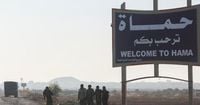In a significant blow to the remnants of the Islamic State, the United States military announced on September 20, 2025, that it had killed Omar Abdul-Qader, also known by his nom de guerre Abdul-Rahman al-Halabi, during a raid in central Syria. The operation, coordinated with Iraq’s counterterrorism service and the broader US-led international coalition, targeted a figure described by multiple agencies as the head of Islamic State’s foreign operations and a direct threat to the United States and its allies.
According to statements from US Central Command and corroborated by Iraq’s counterterrorism agency, Abdul-Qader was not just another militant in the ranks of the Islamic State. He was accused of masterminding or overseeing attacks far beyond the Middle East, including the notorious 2013 bombing of the Iranian Embassy in Beirut, which killed more than 20 people, among them Iran’s cultural attaché. The Iraqi service further claimed that Abdul-Qader had plotted additional operations in Europe and the United States, though timely intelligence work prevented these plans from coming to fruition.
The US military’s statement was clear and resolute in its assessment of the threat posed by Abdul-Qader. He was described as “an operative who posed a direct threat to the United States.” Admiral Brad Cooper, commander of US Central Command, emphasized the coalition’s commitment in the aftermath of the raid, stating, “We will not stop in pursuing terrorists who intend to attack the United States, our forces, or our allies and partners abroad.”
The events leading to Abdul-Qader’s death were the culmination of months of intelligence gathering and international cooperation. Iraq’s counterterrorism agency played a pivotal role in locating the militant, working closely with the US-led coalition. The operation itself took place in the Syrian province of Hama, a region that has witnessed considerable turmoil over the past decade. The Syrian Observatory for Human Rights, a UK-based organization that monitors the conflict, confirmed that Abdul-Qader was killed during the raid. Rami Abdurrahman, the Observatory’s chief, noted that Abdul-Qader, a Syrian national, had a complicated history with regional authorities.
According to the Observatory and Iraqi sources, Abdul-Qader was previously arrested in Lebanon and subsequently handed over to Damascus authorities during the rule of Syrian President Bashar al-Assad. However, following Assad’s ousting in December 2024—a seismic event in Syrian politics—Abdul-Qader managed to escape from prison and had been on the run ever since. His ability to evade capture for months after his escape underscored both his resourcefulness and the ongoing instability in post-Assad Syria.
The operation that led to Abdul-Qader’s death is the latest in a series of targeted strikes by the US and its allies against Islamic State figures in Syria. US Central Command has repeatedly warned that, despite the group’s territorial defeat—first in Iraq in 2017 and then in Syria two years later—Islamic State cells remain active in the region. The group, which once controlled vast swathes of territory and declared a caliphate in 2014, has been reduced to a shadow of its former self. Yet, as recent events prove, its leadership continues to harbor ambitions of resurgence and global reach.
Abdul-Qader’s role as head of external operations and security placed him at the heart of those ambitions. The Iraqi counterterrorism agency’s statement accused him of overseeing attacks in several countries and of planning further operations in Europe and the United States that were ultimately thwarted. While the specifics of these foiled plots have not been publicly disclosed, the agency’s claims align with the US assessment of Abdul-Qader as a persistent and dangerous operative.
Notably, the Syrian Observatory for Human Rights reported that none of the attacks Abdul-Qader had planned after his escape were actually carried out. This failure, observers suggest, is a testament to the effectiveness of ongoing intelligence and counterterrorism efforts by the US and its partners. Still, the fact that such a high-ranking and experienced militant managed to remain at large for months after escaping custody is a sobering reminder of the region’s volatility and the challenges facing security services.
The raid also highlights the evolving nature of the fight against terrorism in Syria and Iraq. With the fall of Bashar al-Assad’s regime in December 2024, the security landscape in Syria has shifted dramatically. The power vacuum left by Assad’s departure has complicated efforts to maintain order and track fugitives such as Abdul-Qader. As the BBC and other outlets have reported, US officials continue to warn that Islamic State hopes to exploit this instability to reestablish itself in Syria.
For Iraq, the operation is a further demonstration of its growing capabilities in counterterrorism and its ongoing partnership with the US and international coalition. The Iraqi counterterrorism agency’s involvement in both the intelligence phase and the execution of the raid was prominently acknowledged in statements from both Baghdad and Washington. This cooperation, officials say, will be crucial in preventing the Islamic State and similar groups from regaining a foothold in the region.
The international significance of Abdul-Qader’s death extends beyond the immediate tactical victory. The 2013 bombing of the Iranian Embassy in Beirut, for which he was implicated, remains one of the most brazen attacks attributed to the Islamic State’s external operations wing. The attack killed more than 20 people, including a senior Iranian diplomat, and sent shockwaves through the region. By targeting the mastermind behind such operations, the coalition aims to send a message that those who plan and execute attacks on civilians and diplomats will be relentlessly pursued.
Despite the successful outcome of the raid, questions remain about the broader trajectory of the Islamic State and the long-term prospects for stability in Syria. The group’s ideology and networks continue to inspire and facilitate violence, even as its leadership suffers repeated setbacks. US Central Command and its partners have vowed to remain vigilant, with Admiral Cooper reiterating the coalition’s commitment to pursuing terrorists wherever they may be found.
As the dust settles in Hama province and regional actors assess the implications of Abdul-Qader’s death, one thing is clear: the fight against extremism in Syria and beyond is far from over. The removal of a key figure like Abdul-Rahman al-Halabi may disrupt the Islamic State’s external operations, but the underlying conditions that gave rise to the group remain complex and unresolved. For now, the coalition’s message is one of resolve and continued cooperation, determined to prevent another resurgence of terror in the region.





